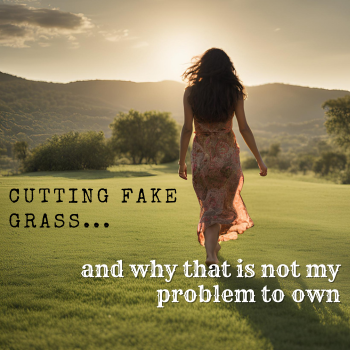In a recent session, we found ourselves discussing what it means to own a problem.
While it’s not a new topic, it often pops up for people around the same time and becomes a bit of a theme.
This particular conversation was about the decision to take ownership of a problem that isn’t truly yours to solve. Just a few days ago, I saw this concept play out in a hardware store of all places.
On a recent camping trip, a fellow camper brought a piece of artificial grass. She used it for everything—from a comfortable lounging spot on the ground to a way to keep her feet clean after a shower. Ingenious, right?
So, off we went to a hardware store to get our own piece of this luxurious yet practical addition to camping gear.
The adventure began immediately. The artificial grass was on a massive 2-meter-wide roll, awkwardly wedged between shelves of arts-and-crafts supplies and other stock. Two employees struggled to wrestle it free without toppling anything, while I kept a safe distance, trying to stay out of the line of fire as they finally heaved it onto the floor.
After scrounging around for tools, they finally came up with a box cutter and a pair of ordinary scissors. I wasn’t paying close attention until I noticed the young man trying to fold the grass just right so he could cut it mid-air without damaging the floor. It didn’t go smoothly, so he switched to the scissors. This worked but only with considerable effort.
At this point, an older employee approached, grumbling at the young man’s choice of scissors. He then sent someone to fetch his pair of scissors. I assumed they’d be a sturdier, industrial pair—after all, the grass was 20 mm thick with a rubber backing.
Soon, they returned… with the exact same scissors the young man had been struggling with.
I watched as the older employee stubbornly attacked the grass roll, hacking away with no less frustration than his younger colleague, while the others looked on with blank, slightly defeated expressions. A few possible solutions ran through my mind, but in that moment, a question popped up:
“Is this my problem to own?”
The answer was clear: it wasn’t. Here were five people in the middle of a hardware store, grappling with the tools and plan they had chosen. And so, I simply turned around and walked away.
Now, you might ask, why didn’t I say something or offer to help ease the frustration around that roll of grass?
You might be surprised to hear that, for me, this small incident was actually a huge victory.
As someone with strong habits of taking ownership, being responsive and having an attitude of getting involved, I’ve found myself in plenty of situations where I’ve taken extreme ownership of a task, only to end up doing the work alone and at a heavy personal cost.
In this moment, though, I saw that despite their frustration, they were making progress.
And by recognising that this wasn’t my problem to own, I found the space to step back, without guilt or frustration.
Yes, it took them longer, and the grass was a bit rough around the edges—but we got what we came for.
So this week, when you face a frustrating situation, ask yourself:
“Is this my problem to own?”
-
If the answer is yes, roll up your sleeves and get it done.
-
If it’s not, politely remove yourself from the situation, either physically or mentally, and do something else that gives you energy and space to avoid worrying about things that aren’t in your control.
One of my clients recently faced a similar moment when a colleague reacted badly to some feedback she’d given. While we can (and should) take full responsibility of how we deliver feedback, how someone responds isn’t our problem to own.
Of course, this isn’t always simple. It takes practice to discern what part of a problem is actually yours to handle.
Going forward, this simple question—“Is this my problem to own?”—is definitely going into my toolbelt. From now on, it’ll be one of the first questions I ask myself when faced with a challenge.
If you’re interested in exploring how to approach challenges with fresh perspective and identify which problems are yours to own, I’d love to help. Book a free discovery session here


Recent Comments